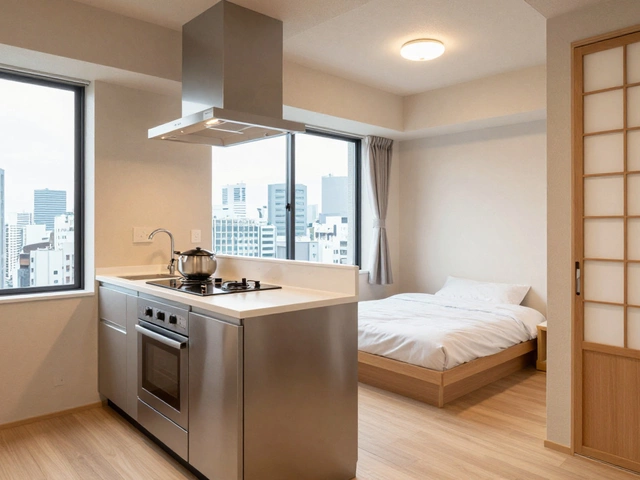Picture this: the freedom of zero mortgage on your house. Now you’re sitting on a mountain of equity—and you have a choice that could shape your next decade. Do you want to pocket a lump sum by selling, maybe splurge on that beach getaway or invest? Or do you want to dive into the rental game, with steady income rolling in each month and the long-term promise of rising property values? Here’s where the decision gets complicated—especially lately, with high home prices and fierce rental demand both staring you in the face.
The Financial Facts: What Happens When You Sell?
Let’s break it down: selling a paid-off house hands you immediate access to a huge chunk of cash. You’re looking at your home’s market value, minus any selling expenses and taxes. Right now, according to Redfin’s national report from spring 2025, the median U.S. home price is just over $426,000. If your house is paid off, that’s a lot of dry powder for new investments or adventures.
But don’t ignore the costs lurking behind the scenes. Sure, there’s no mortgage left to pay, but the average seller will lose about 5-6% of the sale price to agent commission alone. Tack on another 1-2% for closing costs like taxes, title fees, and that new paint job to attract buyers. Here’s a look at real numbers:
| Home Price | Agent Fee (6%) | Other Selling Costs (2%) | Estimated Cash in Hand |
|---|---|---|---|
| $400,000 | $24,000 | $8,000 | $368,000 |
| $500,000 | $30,000 | $10,000 | $460,000 |
See how those fees nibble away at your payday? There are also capital gains taxes to think about—though if you’ve lived in your house for at least two of the last five years, you can avoid taxes on the first $250,000 of profit (double that if married, thanks to the IRS’s home sale exemption as of 2025). But if your home shot up in value, or you weren’t a full-time resident, Uncle Sam will want a piece.
Now, what could you do with that money? Selling gives you the ammo to invest in stocks or mutual funds (with the S&P 500 averaging just over 10% annual returns, historically), buy another property, launch a side business, or finally live mortgage-free in a sunnier zip code. No landlord headaches, no middle-of-the-night emergency calls. If your neighborhood’s seen its best days and prices are peaking, selling can lock in gains and let you skip the rollercoaster of property values dropping.
Banks still give pitiful rates for savings accounts—barely 1-2% in 2025—but alternative investments like CDs and high-yield money markets might offer you just over 4-5% if you want to play it safe, though with inflation still weighing on returns.
Rental Realities: Pros, Payouts, and Pitfalls
Now, renting out your paid-off house flips the script completely. Instead of one lump sum, you get a new stream of passive income, which can be a dream come true—if you’re ready for hands-on work. Renters are desperate in most cities; Zillow’s June 2025 data show that average U.S. rents have climbed to $2,150 per month, up 7% year-over-year. In hot markets like Austin, Nashville, or Tampa, rents have shot up even further.
Here’s a quick breakdown of how that $2,150 monthly rent looks in a real scenario:
| Monthly Rent | Annual Rent Collected | Est. Yearly Expenses* | Net Cashflow |
|---|---|---|---|
| $2,150 | $25,800 | $8,900 | $16,900 |
- Expenses include property taxes, insurance, repairs, vacancy (usually ~8% of annual rent), and property manager fees (if you use one).
Even with expenses, you could be pocketing $1,400 a month, or more if local rents are high and your place is low maintenance. Not terrible, especially if you’re retired or want to build a steady investment income.
Besides monthly income, you score long-term appreciation. Owning means your house could keep gaining value—historically, U.S. homes appreciate about 3-5% a year (though that number can swing wildly depending on where you live and what’s happening in the market). Every month, you’re getting both cash flow and more equity. If inflation picks up—and boy, has it been bumpy in the last couple of years—rents and home values often rise with it, protecting your wealth in ways that cash in the bank can’t match.
Here’s the not-so-glamorous side: being a landlord is work. You’ll field tenant calls, fix busted sinks, track down late rent, and shell out for repairs or upgrades. Hiring a property manager can eat up 8-10% of your rent, but saves you stress and midnight calls from tenants locked out in their pajamas. There’s also risk—non-paying renters, long vacancies, neighborhood downturns, new laws that can make evictions tougher, or property values dropping overnight. And yes, taxes. Those steady rent checks still get taxed, though you can deduct mortgage interest (if any), depreciation, taxes, insurance, and repairs.
Want a quick rundown of rental wins and headaches? Here you go:
- Upsides: Steady cash flow, house can keep appreciating, tax deductions, hedge against inflation, flexibility to sell later.
- Downsides: Time and energy managing property, repair/maintenance costs, risk of bad tenants or vacancies, evolving regulations.
If your property is in a place that’s booming—think suburbs with new tech jobs, walkable urban neighborhoods, or areas with strong schools—rents and values could easily outpace inflation for years. But if you live somewhere that’s losing jobs or residents, it might be smarter to cash out now.

Key Questions To Ask Yourself First
This is where it really gets personal. Numbers matter, but your answers to a handful of practical questions could point to the right move faster than any spreadsheet.
- Do you want to be a landlord? Some folks relish managing properties, others would rather pull teeth. Be honest about your patience with repairs, calls, and collecting rent.
- Is your neighborhood on the rise? Check local trends: Are prices and rents climbing, or has growth peaked? Census data and local real estate reports (check Realtor.com, Redfin) are gold mines here.
- How’s your emergency fund? If owning a rental, keep at least three months’ expenses set aside for vacancies or disasters. Same goes for selling—what will you do if your next plan takes a while to pan out?
- Do you need fast cash? Life changes—medical bills, debt, divorce, college. If you need serious money fast, selling usually wins.
- How savvy are you about taxes? Rentals offer big deductions, but you’ll want a top-notch tax pro. Selling might give you the clean break and cap gains tax exemption if you qualify.
- Where will you live next? If you’re moving across the country, being a long-distance landlord can be a major hassle unless you pay for management.
- How old are you? Some retirees look for hassle-free income; others want the freedom to travel or invest without ties to property upkeep. That free time is worth plenty.
Put simply: if you want quick, risk-free money with no property headaches, selling is usually your best bet. But if you’re patient and looking to build wealth over time, especially in a strong rental market, keeping your place could outpace most stocks or bonds—if you’re smart about management.
Strategies to Max Out Your Choice
You’ve weighed selling against renting—but what if you want both security and opportunity? Here are some plays that blend caution with upside.
- Hybrid approach: Rent your house for one or two years, pocket the cash, then sell while still qualifying for the capital gains break. It’s like a test run for the landlord life without locking you in long term.
- Short-term rental: In tourist hot spots or college towns, platforms like Airbnb and Vrbo can deliver double or triple what you’d get from a regular tenant—though you’ll deal with higher turnover and more regulations. Some cities now cap how many days you can rent, so check local laws first.
- 1031 Exchange: If selling, you could use a 1031 exchange and roll your proceeds right into another investment property tax-free, letting you grow your real estate empire without paying capital gains until you cash out eventually.
- Borrow against your equity: If you like the rental game, use your equity to fund another house or duplex. Banks love loaning to people with paid-off homes—HELOC rates hover around 6-8% in 2025, so run your numbers carefully.
- Get a professional property manager: The best ones have local contacts for repairs, screen tenants fast, and keep hassles off your plate. Their yearly cut pays for peace of mind—plus, the fees are deductible.
- Consider inflation: With U.S. inflation running just above 4% in mid-2025, hard assets like real estate typically hold up better than cash or low-yield savings. If you’re spooked by the shrinking dollar, owning your house as a rental might be the ultimate hedge.
- Long-term future—kids and inheritance: Sometimes keeping the old family home for the next generation is more about legacy than numbers. If your kids want to live there someday, or might need rental income, factor that into your plans.
Just don’t let emotions or inertia make the choice for you. Run real numbers, talk with financial pros, listen to your gut, and don’t forget what you want life to look like next year—not just this week.
The hard truth? The state of the housing market in 2025 is unpredictable—rents are high, but landlords face more rules and renters are getting pickier. Trying to time the "peak" is tough even for pros. But armed with clear facts, savvy strategy, and eyes wide open to the work and rewards each path brings, there’s no reason you can’t come out ahead—no matter what you decide to do with that paid-off house.





